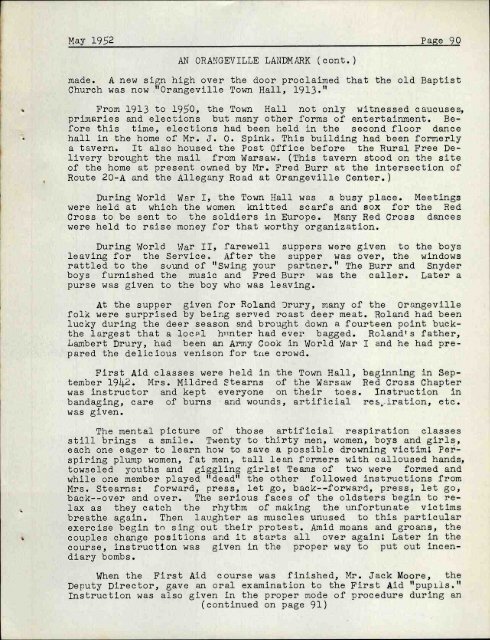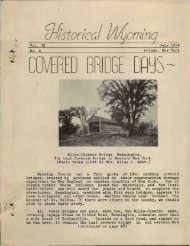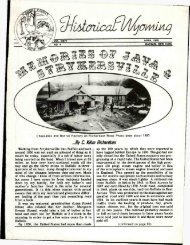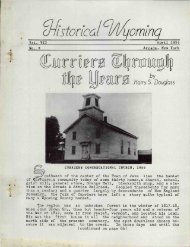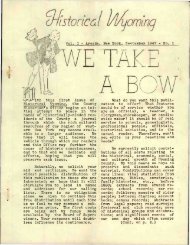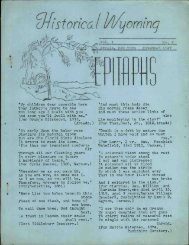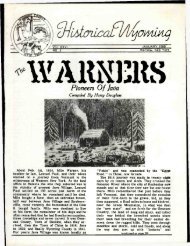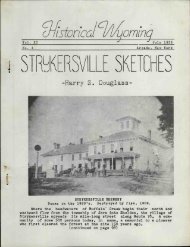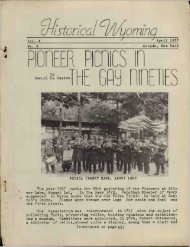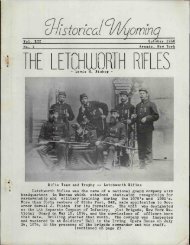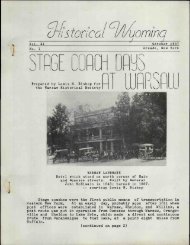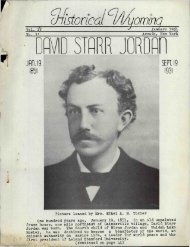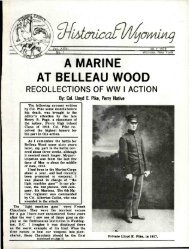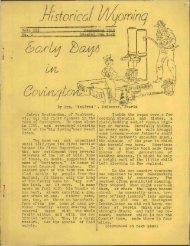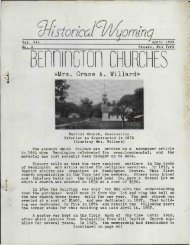Historical Wyoming County May 1952 - Old Fulton History
Historical Wyoming County May 1952 - Old Fulton History
Historical Wyoming County May 1952 - Old Fulton History
Create successful ePaper yourself
Turn your PDF publications into a flip-book with our unique Google optimized e-Paper software.
<strong>May</strong> <strong>1952</strong> Page 90<br />
AN ORANGEVILLE LANDMARK fcont.)<br />
made. A new sign high over the door proclaimed that the old Baptist<br />
Church was now "Orangeville Town Hall, 1913."<br />
Prom 1913 to 1950, the Town Hall not only witnessed caucuses,<br />
primaries and elections but many other forms of entertainment. Before<br />
this time, elections had been held in the second floor dance<br />
hall in the home of Mr. J. 0. Spink» This building had been formerly<br />
a tavern. It also housed the Post Office before the Rural Free Delivery<br />
brought the mail from Warsaw. (This tavern stood on the site<br />
of the home at present owned by Mr. Fred Burr at the intersection of<br />
Route 20-A and the Allegany Road at Orangeville Center.)<br />
During World War I, the Town Hall was a busy place. Meetings<br />
were held at which the women knitted scarfs and sox for the Red<br />
Cross to be sent to the soldiers in Europe. Many Red Cross dances<br />
were held to raise money for that worthy organization.<br />
During World War II, farewell suppers were given to the boys<br />
leaving for the Service, After the supper was over, the windows<br />
rattled to the sound of "Swing your partner." The Burr and Snyder<br />
boys furnished the music and Fred Burr was the caller. Later a<br />
purse was given to the boy who was leaving.<br />
At the supper given for Roland Orury, many of the Orangeville<br />
folk were surprised by being served roast deer meat. Roland had been<br />
lucky during the deer season and brought down a fourteen point buckthe<br />
largest that a local hunter had ever bagged. Roland's father,<br />
Lambert Drury, had been an Army Cook in World War I and he had prepared<br />
the delicious venison for txie crowd.<br />
First Aid classes were held in the Town Hall, beginning in September<br />
19^+2. Mrs. Mildred Stearns of the Warsaw Red Cross Chapter<br />
was instructor and kept everyone on their toes. Instruction in<br />
bandaging, care of burns and wounds, artificial respiration, etc.<br />
was given.<br />
The mental picture of those artificial respiration classes<br />
still brings a smile. Twenty to thirty men, women, boys and girls,<br />
each one eager to learn how to save a possible drowning victimi Perspiring<br />
plump women, fat men, tall lean farmers with calloused hands,<br />
towseled youths and giggling girls I Teams of two were formed and<br />
while one member played "dead" the other followed instructions from<br />
Mrs. Stearns: forward, press, let go, back--forward, press, let go,<br />
back--over and over. The serious faces of the oldsters begin to relax<br />
as they catch the rhythm of making the unfortunate victims<br />
breathe again. Then laughter as muscles unused to this particular<br />
exercise begin to sing out their protest. Amid moans and groans, the<br />
couples change positions and it starts all over againl Later In the<br />
course, instruction was given in the proper way to put out incendiary<br />
bombs.<br />
When the First Aid course was finished, Mr. Jack Moore, the<br />
Deputy Director, gave an oral examination to the First Aid "pupils."<br />
Instruction was also given In the proper mode of procedure during an<br />
(continued on page 91)


